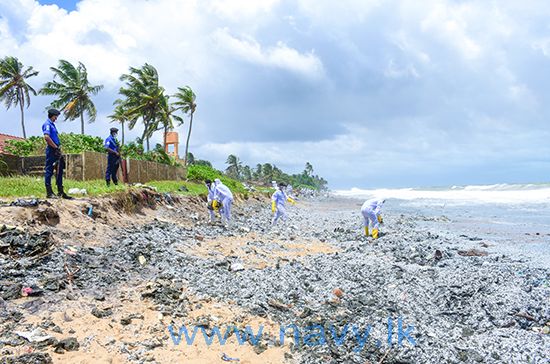EU provides emergency relief to victims of X-Press Pearl cargo ship fire in Sri Lanka. The aid will benefit 15,000 people who have been heavily affected by the disaster
The EU is providing emergency relief to victims of the X-Press Pearl fire in Sri Lanka. The aid will include cash assistance to small-scale fishing communities and will also focus on supporting local authorities to clean hazardous and toxic materials. The European Union is directing €200,000 (over 48 million Sri Lankan rupees) in humanitarian funding to provide crucial assistance.
Full Press Release – In response to serous oil and hazardous chemical spills triggered by the fire that broke out on a ship carrying hazardous substances in May, the European Union is directing €200,000 (over 48 million Sri Lankan rupees) in humanitarian funding to provide crucial assistance. The aid will benefit 15,000 people who have been heavily affected by the disaster in the districts of Colombo, Galle, Gampaha, Kalutara, Puttlam and Matara.
This EU funding supports the Sri Lanka Red Cross Society in delivering emergency relief assistance to those most affected, especially small-scale fishing communities, through the delivery of cash assistance. This will help meet the immediate needs of those whose day-to-day livelihoods have been impacted by the fishing ban implemented following the incident. The aid will also focus on supporting local authorities to clean hazardous and toxic materials along the country’s west coast. Necessary training and materials, such as personal protective equipment, goggles and boots, will also be provided to volunteers involving in the cleaning activities. Special attention will be paid to the most vulnerable groups, including female-headed families, people with disabilities and the elderly.
The funding is part of the EU’s overall contribution to the Disaster Relief Emergency Fund (DREF) of the International Federation of Red Cross and Red Crescent Societies (IFRC).
Sri Lanka is witnessing what has been considered one of the worst marine environmental disasters after the X-Press Pearl cargo vessel carrying a large number of toxic chemicals and plastic granules caught fire some 16 kilometres off the coast of Colombo on 20 May. The fire that continued for 12 days resulted in a massive spillage of damaged containers, microplastics, plastic pellets, chemicals and other harmful substances into the sea. Following the incident, small-scale fishing has been banned on a 50-kilometre stretch of coastline in Colombo and Gampaha. In additional to the severe damage to the marine and coastal ecosystems, the incident has also affected over 16,000 fishing communities in six coastal districts who are dependent on fishing for a living. The Sri Lankan fishing sector has already been largely affected by the COVID-19 pandemic and monsoon weather conditions.
Background
The European Union together with its Member States is the world’s leading donor of humanitarian aid. Relief assistance is an expression of European solidarity towards people in need around the world. It aims to save lives, prevent and alleviate human suffering, and safeguard the integrity and human dignity of populations affected by natural disasters and man-made crises.
Through its European Civil Protection and Humanitarian Aid Operations (ECHO), the European Union helps over 120 million victims of conflicts and disasters every year. For more information, please visit ECHO’s website.
The European Commission has signed a €3 million humanitarian contribution agreement with the International Federation of Red Cross and Red Crescent Societies (IFRC) to support the Federation’s Disaster Relief Emergency Fund (DREF). Funds from the DREF are mainly allocated to “small-scale” disasters – those that do not give rise to a formal international appeal.
The Disaster Relief Emergency Fund was established in 1985 and is supported by contributions from donors. Each time a National Red Cross or Red Crescent Society needs immediate financial support to respond to a disaster, it can request funds from the DREF. For small-scale disasters, the IFRC allocates grants from the Fund, which can then be replenished by the donors. The contribution agreement between the IFRC and ECHO enables the latter to replenish the DREF for agreed operations (that fit in with its humanitarian mandate) up to a total of €3 million.

